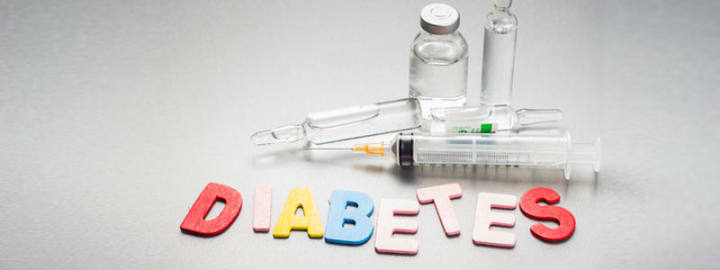Proven methods to help best in managing and regulate Diabetes
Best approach to maintain blood sugar with proven methods and tips


Diabetes is among leading causes of serious health complications and even fatality. To begin the idea of maintaining, managing and controlling blood sugar levels, we must learn to have some better understanding. If left unchecked blood sugar level shoots uncontrolled and becomes very difficult to say the least. Above all Diabetes management is very personalized process and goes a long way as it is all about serious commitment to lifelong changes to adopt. It is in your power to still live a healthy life and enjoy with lifestyle adjustments to be the support framework in place. So as long as you are going to strictly follow the advice of health professionals and experts, stick with healthy choices with some regulating adjustments and live by better choices, you can still be very well functioning and able to live much longer than you would expect.
The course of action begins with your pure commitment to your wellbeing. First of all the basic lifestyle choices you need to consider are much simpler to live by. These best tips and proven methods will require some little efforts from you to provide a base and adjust your body by adopting these simple changes and get you equipped in simple way to regulate and maintain blood sugar level.
1. Healthy Balanced Dietary Choices. To get going on the path of easy to control and maintain blood sugar level, is to make sure that you eat healthy. Healthy eating consist of fresh nutritious ingredients, as healthy diet directly effects your blood level to make it easier to take control and so it is crucial and critical, every step of the way. To begin, consider adding more fiber high, low fat, moderate in carbohydrates. Avoid all sugary content things and processed foods. Do not use preservatives added foods. Eat well balanced nutritional value, simple, fresh foods to keep less burden on your body.

2. Make a point to have physical activity. Get grooving, get moving, regular exercise is a must. Exercising regularly adds valuable regulatory factor to help digest well and control blood sugar level, as well it helps gain momentum to aid and improve insulin sensitivity, lower the risk of heart disease. Once you get in activity routine, preferably stretch it to 30 minutes in a single go initially and increase it from there to two full sets of 30 minus a day, split in over twice a day with moderate intensity gradually.

3. Since Diabetes is such a killer chronic condition that basically affects your base immune system by affecting your body’s capabilities to break glucose content for energy consumption ratio and that goes on to effect multitude of core systems like nerve damage, kidney functions, weakens heart and so on. Since this is all well-known and clear, let’s emphasize on the importance of taking prescribed medication regularly. If you are Diabetic and you have prescribed medication to help you manage your symptoms and regulate your condition to better deal with diabetes, you must not skip any as your body cannot afford that luxury as it is going to affect a lot down the road. It is so very basic to understand the significance and importance of taking your medication at all costs. Skipping, not taking or taking irregularly can have serious damages to severe conditions which can turn fatal so easily. Once we have got that out of the way, let’s continue.
4. Maintain a regular cycle to monitor blood sugar. Checking you sugar allows you to be prepared as it is indicative to the factors working for you. It is highly advisable to keep regular check on your sugar level as it helps you manage the risks better as well as gives you better chance to understand how you are doing overall, letting you know about the progress and helps you understand on metrics of how well your body is responding to the changes you adopt and how you need to tweak the adjustments to obtain better, improved results. Monitoring also leads you ahead by letting you able to identify patterns to adjust further with your diabetes management plan.
5. Make an effort and get in regular clinical check-ups habit. Regular intervals base check-ups can help avoid so many damaging situations prior to the collation course. You can easily have an upper hand, advantage in dealing with so many conditions directly related to diabetes. Regular check-ups can provide you with customary benefit to help you stay on top of your fight managing risks. Healthcare provider can be in better position to inform you with things ahead to avoid complications and adjust your treatment plan as needed.
6. Manage stress: Stress can cause blood sugar levels to rise, so it is important to find ways to manage stress. This may include relaxation techniques, such as deep breathing, meditation, or yoga. Work with professional care givers and support groups to help figuring all the best ways to help reduce stress. Find ways to tackle and avoid all stress causing factors.
7. Quit smoking: Smoking can increase the risk of complications associated with diabetes, such as heart disease and nerve damage. Quitting smoking can help improve overall health and reduce the risk of complications. If you are a smoker, this is the starting point. This is a key factor and you must do whatever you can bring in enforcements to help you kick this habit for good, because of the increasingly high risk associated. Remember, the things we are covering here are of high importance so keep in mind that simple devotion, concentrated efforts and dedication can go a long way, plays major role and consist of the key elements for your fight. So by simply following these tips, you are better equipped in helping control your blood sugar levels, reduce the risk of complications, and improve overall health to your well-being. Make a dedicated effort to do all you can to begin your journey to healing and full recovery with these aiding strategies.
8. Get enough sleep: Lack of sleep can disrupt hormone levels and lead to insulin resistance, which can cause blood sugar levels to rise. Aim for 7-8 hours of minimum single stretch sleep each night to help regulate blood sugar levels. Sleep plays fundamental role in our overall wellbeing and it adds value to your mental strength as well as help boost your immune system to gain further in regulating factor. Sleep basically provide core framework to repair and revive vital functionality to essential organs.
9. Stay hydrated: Drinking enough water is important for managing diabetes. Dehydration can cause blood sugar levels to rise, so it's important to drink plenty of water throughout the day. Staying well hydrated can help cleanse internally by detoxing your body and aid in regulating the levels.
10. Manage your weight: This is a crucial part to get your attention and understanding. Maintaining a healthy weight is important for managing diabetes. If you are overweight or obese, losing weight can help improve insulin sensitivity and blood sugar control. Your focused effort to maintain and control you intakes and your weight are directly responsible to the risks involved, so take every measure to help reduce and maintain weight.

11. Work with a diabetes educator: A diabetes educator can provide you with much vital insight which can help you understand how to better regulate and manage your diabetes, including how to monitor blood sugar levels, adjust medications, and make lifestyle changes further if required.
12. Wear a smart wearable device like medical alert bracelet: In case of an emergency, it's important to wear a medical alert bracelet or necklace that identifies you as having diabetes. This can help first responders provide appropriate care which gives you better chances of survival.
13. Manage other health conditions: If you have other health conditions, such as high blood pressure or high cholesterol, it's important to manage these conditions as well. High blood pressure and high cholesterol can increase the risk of complications associated with diabetes.
14. Educate yourself: Educating yourself about diabetes can help you better understand how to manage your condition and deescalate in needed. You have got many reliable venues today to obtain crucial information, read books, attend classes, or join support groups to learn more about diabetes management.
15. Avoid alcoholic drinks: Drinking alcohol can cause blood sugar level surges and fluctuates, it may give boost and cause rise or fall in your sugar levels unpredictably, so it's very important to avoid alcohol consumption. If you choose to drink, limit yourself to one drink per day at the most for women or two drinks per day for men, and always drink with healthy food, not at empty stomach.
16. Practice good foot care: Diabetes can cause nerve damage and affect blood circulation ability, which can lead to foot problems. To prevent foot problems, it's important to wear comfortable shoes that fit well, check your feet regularly for any signs of cuts or blisters, and see a healthcare provider if you notice any problems.
17. Practice good oral hygiene: Diabetes can increase the risk of gum disease and other oral health problems, so it's important to practice good oral hygiene. This includes brushing your teeth twice a day, flossing daily, and seeing a dentist regularly for check-ups.
18. Use technological advancements to your benefit which can make it easier in timely manner to track your diabetes: There are many apps and devices available that can help you track your blood sugar levels, food intake, and physical activity which necessarily means allow you to get grip and handle you status better. Using technology can help reduce risk as you become better in understanding how your body responds to different foods and activities, and make adjustments to your diabetes management plan accordingly.
19. Be always well prepared for emergencies: Always carry a source of fast-acting carbohydrates, such as glucose tablets or juice, in case of a low blood sugar emergency. It's also important to have an emergency kit with insulin, syringes, and other diabetes supplies on hand.
20. Get support: Managing diabetes is often considerably challenging endeavor, and it makes even so more important to have a support system in place to deal with unfortunate emergency events. This can include family, friends, extended support social circle, healthcare providers, or support groups. Having a support system can help you stay motivated and on track with your diabetes management plan as well.
21. Consider complementary therapies: There are several complementary therapies that may help manage diabetes, such as acupuncture, massage therapy, and herbal supplements. However, it's important to talk to your healthcare provider before trying any complementary therapies to ensure they are safe and effective for you.
22. Practice intermittent fasting: Intermittent fasting is a pattern of eating that involves alternating periods of fasting with periods of eating. Some studies suggest that intermittent fasting may help improve blood sugar control and insulin sensitivity in people with diabetes. However, it's important to talk to your healthcare provider before trying intermittent fasting, as it may not be appropriate for everyone.
23. Try a low-carb or ketogenic diet: A low-carb or ketogenic diet involves reducing carbohydrate intake and increasing fat intake. Some studies suggest that these diets may help improve blood sugar control and insulin sensitivity in people with diabetes. However, it's important to talk to your healthcare provider before trying a low-carb or ketogenic diet, as it may not be appropriate for everyone.
24. Practice mindfulness: Mindfulness is a practice that involves being present and non-judgmental in the moment. Some studies suggest that mindfulness may help improve blood sugar control and reduce stress in people with diabetes. Consider trying mindfulness practices, such as meditation or yoga, to help manage your diabetes.
25. Get enough vitamin D: Vitamin D is important for overall health, and some studies suggest that it may help improve blood sugar control in people with diabetes. Consider getting enough vitamin D through sunlight exposure or supplements, but talk to your healthcare provider first to determine the appropriate dosage for you.
Diabetes management is a very personalized process, and individuals are different in compositions and factors with circumstances hence what works for one person may not work for another. Work with your healthcare provider to develop a personalized diabetes management plan that works best for you and suits you in longer terms to obtain desired outcome.
Living with diabetes is a full time task to live within moderate boarders. But remember, it is still manageable and possible to live a healthy and fulfilling life.
Basically by following these simpler ways, methods and tips, you can achieve so much to help control your blood sugar levels, reduce the risk of complications, and improve overall health to sustainable fulfilling living.
Remember, while these methods and tips are not conventional, they may be helpful for some people with diabetes. However, it's important to talk to your healthcare provider before trying any new approach to diabetes management, to ensure it is safe and effective for you.
Today with progress on so many fronts, some of the emerging technologies with new discoveries and approaches that may revolutionize diabetes management in the future to soon be able to help you further.
A little introduction to few examples of emerging advancements here for your knowledge and consideration.
1. Closed-loop insulin delivery systems: Closed-loop insulin delivery systems, also known as artificial pancreas systems, are a combination of an insulin pump and a continuous glucose monitor. The system automatically adjusts insulin delivery based on real-time glucose readings, helping to maintain stable blood sugar levels. These systems are currently being developed and tested and have shown promising results in clinical trials.
2. Gene therapy: Gene therapy is a technique that involves altering the genetic material of cells to treat or prevent disease. In the case of diabetes, gene therapy could potentially be used to modify beta cells in the pancreas to produce insulin. This approach is still in the early stages of development but shows promise as a potential cure for diabetes.
3. Smart insulin: Smart insulin is a type of insulin that is designed to activate in response to high blood sugar levels and deactivate when blood sugar levels return to normal. This could potentially eliminate the need for frequent insulin injections and help improve blood sugar control.
4. Artificial intelligence and machine learning: Artificial intelligence (AI) and machine learning models are being tuned and are being used to develop algorithms that can predict blood sugar levels and adjust insulin dosages accordingly. This approach has the potential to improve blood sugar control and reduce the risk of complications associated with diabetes.
5. Nutrigenomics: Nutrigenomics is the study of how diet and nutrition impact gene expression. In the case of diabetes, nutrigenomics could potentially be used to develop personalized dietary recommendations that are tailored to an individual's genetic makeup. This could potentially improve blood sugar control and reduce the risk of complications associated with diabetes.
These new solutions from emerging technologies and approaches are still in development and may take time to be widely available, perhaps even a few years. However, they offer promising new avenues for diabetes management and potential cures in the future.
In conclusion here is value adding offer to aid you with regulating your sugar at home naturally. It is a simple to adopt regime to help you in managing your sugar naturally at home, covering most aspects comprehensively. Here is the link to access your special offer https://www.digistore24.com/redir/307885/VareeK/
It is a revolutionary solution, preferably give it a try, at-home solution aiding you to keep control and maintain level as it is highly recommended to manage diabetes without drugs actually. All relevant information for you to learn more and gain insight with respectively shedding light on medicines and the effects as well as diets which helps in really making a difference and reduce risks associated with diabetes.






Comments
There are no comments for this story
Be the first to respond and start the conversation.